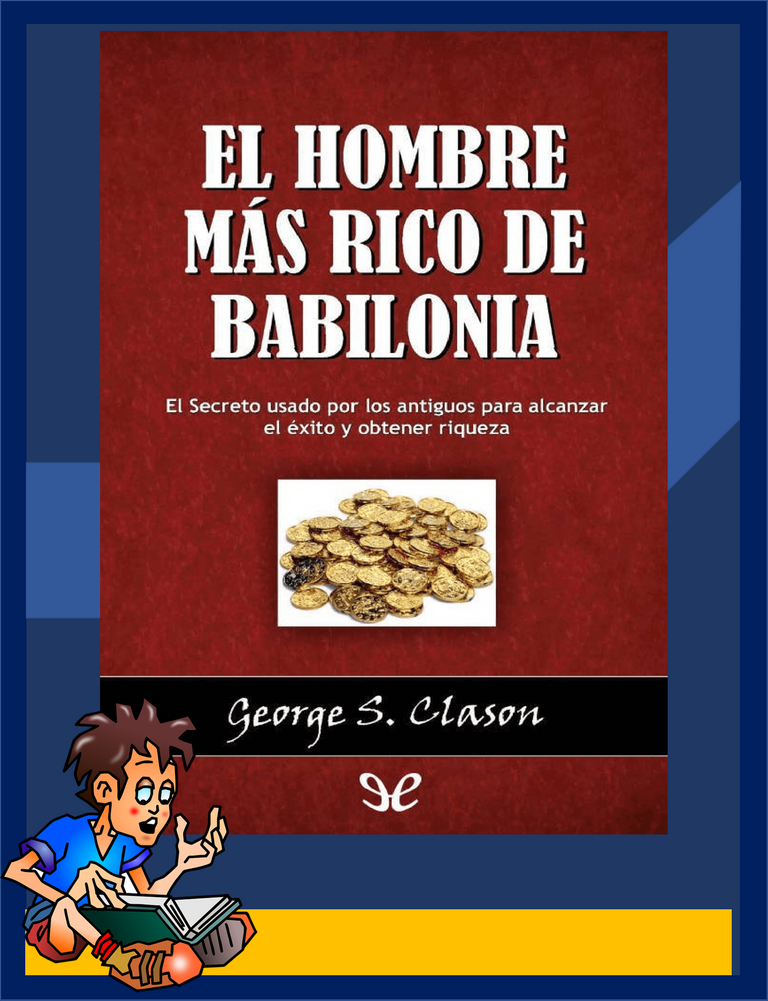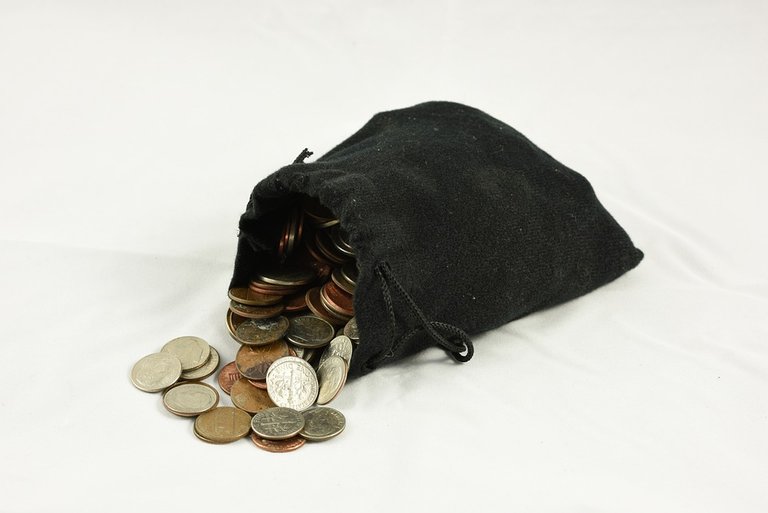
Hoy quiero comentarles de un libro que ocupo mi tiempo en los últimos días y creo que fue una buena inversión de tiempo. Es que a veces le dedicamos algo de tiempo a cierta actividad y al final concluimos que no nos dejo un beneficio y sentimos que hemos perdido el tiempo. Personalmente creo que podemos aprender lecciones a nuestro alrededor y especialmente en lecturas reflexivas. Si pasamos un rato ameno leyendo y eso nos distrae o nos enseña lecciones valiosas definitivamente no hemos perdido el tiempo. Lo hemos invertido bien.
El tiempo en un recurso limitado y costoso que tenemos así que perderlo es como perder el dinero por una mala decisión. Y hablando de dinero el libro que he leído recientemente se titula El hombre más rico de babilonia vi que otros autores lo recomendaban y quise saber su contenido. El autor de este libro es George S. Clason.
Lo primero que me llamo la atención es saber como una cultura que existió hace miles de años pude enseñarnos algo sobre las financias actuales, o si en eses tiempo existían los mismos desafíos para mantenerse a flote económicamente. Y definitivamente si, el enfoque del autor relata sucesos que pudieron haber ocurrido hace mucho tiempo, pero las lecciones y argumentos son muy actuales. Además, trata problemas que representan un gran obstáculo para vivir tranquilos y pagar las cuentas. La codicia el miedo la falta de previsión y una rutina enfocada solo en satisfacer las necesidades del presente pueden ser obstáculos con lo que hay que lidiar para ser realmente productivos.
Aunque el titulo esta en plural no se trata de la historia de un solo hombre si no de un abanico de historias con un dominador común. Todas tienen un antes y un después. En la medida que iba leyendo esas historias me sentí identificado con algunos hombres y entendí la manera de actuar de otros, aunque no comparta su comportamiento o actitud.
Los capítulos se dividen en historias ejemplo la historia de un hombre que era esclavo, pero quería una vida mejor, uno que vendía camellos, un prestamista de oro también esta el padre que enseña a su hijo a manejar su fortuna, él le sobraba habilidad, pero era muy pobre y finalmente un hombre ahogado por sus deudas, pero con un fuerte sentido de responsabilidad.
Aprendí que la capacidad para progresar y ver el resultado de nuestro duro trabajo se aprende y a veces hay que desligarse de conductas o maneras de ver el trabajo y el dinero que, aunque son populares, porque son las reglas que siguen la mayoría de las personas, no nos aportan verdadera satisfacción y ni hablar de los resultados. ahora veo que la mejor ayuda que puede darle alguien exitoso en los negocios a sus amigos o familia no es regalarle dinero o darle trabajo. Aunque esas cosas son útiles lo que de verdad perdura son los buenos consejos. Enseñarle a valerse por si mismos y progresar también.
De verdad que el libro El Hombre más rico de Babilonia fue una buena elección y no solo para entretenerme si no que considero que la receta que nos ofrece al recalcar la idea de hacer crecer nuestra bolsa es adecuada y eficaz. A veces una gasta todo lo que gana en absoluto, pero si uno puede vivir con diez monedas es probable que pueda vivir con nueve y guardar una. Por otro lado, se puede simplemente ahorrar y tener el dinero guardado, pero esto no es eficaz a la larga si no más bien invertirlo de modo inteligente y hacer que ese ahorro crezca en vez de ser consumido por la inflación. Si ha leído libros de finanzas o historia de personas exitosas en el campo de la economía seguramente disfrutaras esa lectura. Seguramente ustedes se identificarán con alguno de los personajes de la narración y experimentará diferentes emociones al notar como sus decisiones financieras marcaron un antes y un después.
Today I want to tell you about a book that occupied my time in the last few days and I think it was a good investment of time. Sometimes we dedicate some time to a certain activity and at the end we conclude that it did not leave us a benefit and we feel that we have wasted our time. I personally believe that we can learn lessons from our surroundings and especially from reflective reading. If we spend an enjoyable time reading and it distracts us or teaches us valuable lessons we have definitely not wasted our time. We have invested it well.
Time is a limited and expensive resource we have so wasting it is like wasting money on a bad decision. And speaking of money the book I recently read is called The Richest Man in Babylon I saw other authors recommending it and I wanted to know its contents. The author of this book is George S. Clason.
The first thing that caught my attention is to know how a culture that existed thousands of years ago could teach us something about today's finances, or if in those times there were the same challenges to stay afloat economically. And definitely yes, the author's approach relates events that could have happened a long time ago, but the lessons and arguments are very current. In addition, he addresses issues that represent a major obstacle to living easy and paying the bills. Greed, fear, lack of foresight and a routine focused only on meeting the needs of the present can be obstacles that must be dealt with in order to be truly productive.
Although the title is in the plural, this is not the story of a single man but a range of stories with a common dominator. They all have a before and an after. As I read these stories, I felt identified with some men and understood the way others act, even if I do not share their behavior or attitude.
The chapters are divided into stories such as the story of a man who was a slave, but wanted a better life, one who sold camels, a moneylender of gold, a father who teaches his son to manage his fortune, he was very skilled, but very poor and finally a man drowned by his debts, but with a strong sense of responsibility.
I learned that the ability to progress and see the results of our hard work is learned and sometimes you have to detach yourself from behaviors or ways of looking at work and money that, although popular, because they are the rules that most people follow, do not bring us real satisfaction, let alone results. I now see that the best help someone successful in business can give to their friends or family is not to give them money or jobs. Although those things are useful, what really lasts is good advice. Teaching them to stand on their own two feet and progress as well.
Truly, the book The Richest Man in Babylon was a good choice and not only to entertain me but I consider that the recipe it offers us to emphasize the idea of making our purse grow is adequate and effective. Sometimes one spends all one earns at all, but if one can live on ten coins one can probably live on nine and save one. On the other hand, one can simply save and have the money put away, but this is not effective in the long run if not rather invest it wisely and make that savings grow rather than be consumed by inflation. If you have read financial books or stories of successful people in the field of economics, you will surely enjoy reading them. You will surely identify with some of the characters in the narrative and will experience different emotions as you notice how their financial decisions marked a before and after.

El hombre mar rico de babilonia es gratuito y esta en varios idiomas así que manos a la obra. En esta línea me despido agradeciéndole por leer mi post y deseando un feliz día, tarde o noche.
The Richest Man in Babylon is free and it is in several languages so let's get to work. In this line I say goodbye thanking you for reading my post and wishing you a happy day, afternoon or evening.